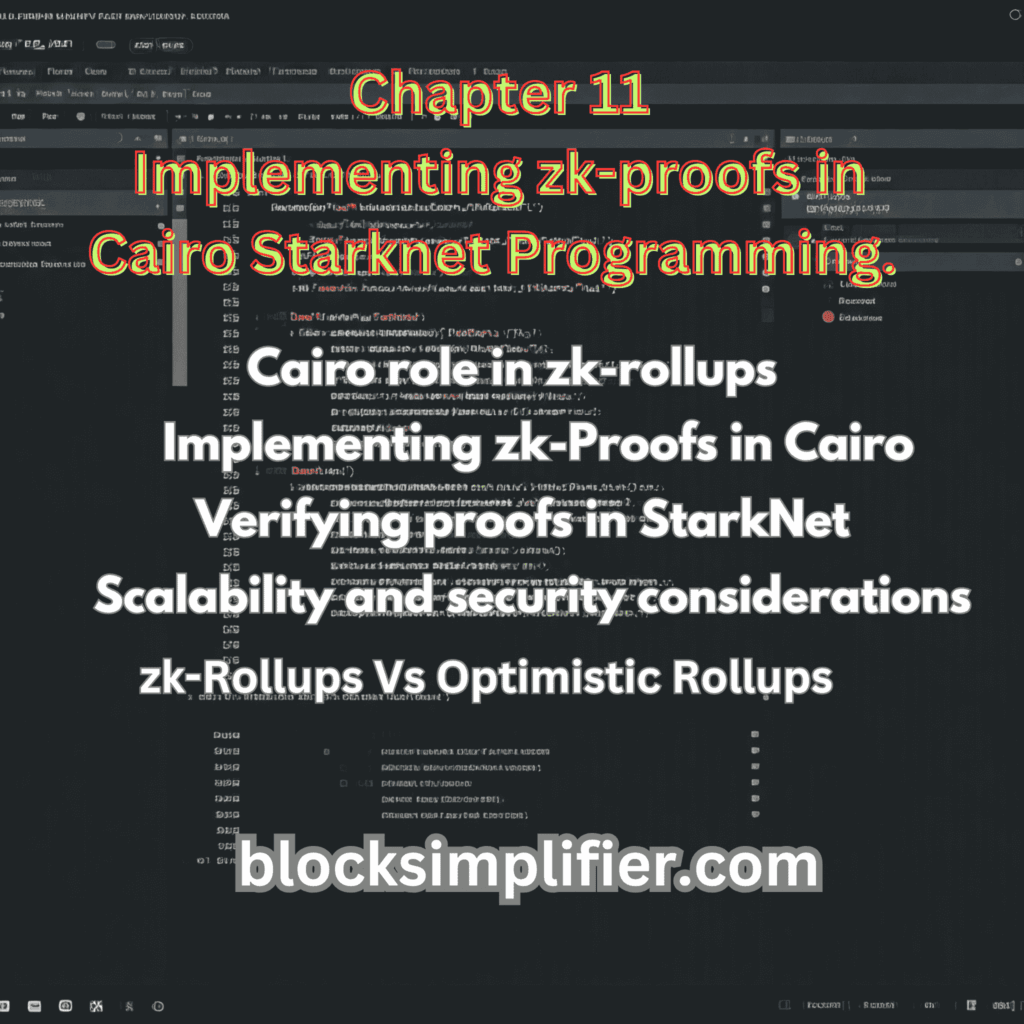zk-Rollups are like clever traffic managers. They group many transactions together off the main Ethereum highway and then send a special “proof” to Ethereum that confirms everything went smoothly. This “proof” is like a secret handshake that only those in the know understand.
- Faster Transactions: Imagine a highway with fewer cars – that’s what zk-Rollups bring. They handle way more transactions without slowing down.
- Lower Tolls: Since you’re only sending a small proof to Ethereum, the “tolls” (transaction fees) are much cheaper.
- Enhanced Security: The special proof guarantees everything is legit without revealing any sensitive details, like your wallet balance.
Table of Contents
Cairo: The Language of zk-Rollups
Cairo is a special language designed specifically for writing the rules for these transactions. Think of it as a secret code that’s easy for developers to learn and use.
- Built for Speed: Cairo is like a race car driver, optimized to create these “proofs” quickly and efficiently.
- User-Friendly: It’s easier to learn than some other languages used for this kind of thing, making it more accessible to developers.
- Security First: Cairo has built-in safety features to prevent common mistakes and keep your digital assets safe.
A Powerful Partnership
zk-Rollups and Cairo work together like a dream team. Cairo makes it easy to create the “proofs” that zk-Rollups need, and zk-Rollups provide the high-speed, low-cost platform.
Real-World Examples:
- StarkNet: A popular platform built on Cairo, offering a wide range of decentralized applications.
- zkSync: Another major player, also supporting Cairo and offering a variety of features.
The Future of Ethereum
Zk-Rollups and Cairo are paving the way for a more scalable and green destiny for Ethereum. They’re like a highway upgrade, making it faster and easier for all people to travel the blockchain.
Cairo role in zk-rollups
Cairo: The Secret Sauce for Scalable zk-Rollups
Imagine trying to prove to someone you observed a recipe efficaciously, but you cannot just show them the components and the final dish.. You need to somehow demonstrate each step of the cooking process without revealing the exact amounts or the secret spices. That’s the challenge zk-Rollups face: proving that a bunch of transactions were processed correctly without revealing any sensitive information.
This is where Cairo comes in. It’s like a special cookbook designed specifically for zk-Rollups.
- Provable Recipes: Cairo helps you write “recipes” (or smart contracts) in a way that makes it easy to create a “proof” that you followed them correctly.
- Tailored for Success: Cairo is like a cookbook written by a master chef, perfectly suited for the unique demands of zk-Rollups. It uses special ingredients (mathematical concepts like finite fields) that make the “proof” compact and easy to check.
- Easy to Learn: While designed for this specific purpose, Cairo is surprisingly easy to learn, making it accessible to a wider range of cooks (developers).
In essence, Cairo bridges the gap between the high-level instructions of a recipe and the nitty-gritty details of proving you followed them correctly.
StarkNet: A Real-World Example
StarkNet is a prime example of this in action. It’s like a bustling kitchen where all the chefs use the Cairo cookbook. Every dish (smart contract) is prepared according to Cairo’s rules, and then a “proof” is generated to ensure everything was cooked perfectly. This allows StarkNet to serve a large number of customers (process many transactions) quickly and efficiently while maintaining the highest quality standards (security and decentralization).
Implementing zk-Proofs in Cairo
While Cairo itself would not without delay “implement” zk-proofs inside the experience of producing them, it performs a crucial function in enabling their efficient introduction and verification inside the context of zk-Rollups. Here’s a breakdown:
1. Cairo’s Role:
- Provable Computation: Cairo is designed for “provable computation.” This means its programs are structured in a way that makes it easier to generate succinct and verifiable proofs of their execution. This is essential for zk-Rollups, where the validity of a large batch of off-chain transactions needs to be proven efficiently on-chain.
- Optimized for STARKs: Cairo is deeply integrated with the STARK proof system. It leverages mathematical concepts like finite fields and elliptic curves, which are fundamental to the construction of STARK proofs. This optimization ensures that the resulting proofs are concise and can be verified quickly.
- Developer-Friendly: Cairo provides a high-level language for writing smart contracts, making it more accessible to developers than lower-level languages that might be required for direct STARK proof generation.
2. The Proof Generation Process:
- Cairo Program Execution: A Cairo program is executed, generating a trace of its execution. This trace includes the program’s state at each step.
- Proof Generation: A specialized prover (like StarkWare’s SHARP) takes the execution trace as input and generates a zk-STARK proof. This proof mathematically demonstrates the correctness of the computation without revealing any sensitive data.
- Proof Verification: The generated proof is submitted to a verifier contract on the Ethereum mainnet. This contract efficiently checks the validity of the proof, ensuring that the off-chain computation was performed correctly.
3. Key Considerations:
- Proof Size and Verification Time: A significant focus in Cairo development is minimizing proof size and verification time to ensure scalability and efficiency.
- Security: The security of the entire system relies heavily on the soundness of the STARK proof system and the correct implementation of Cairo and the prover.
- Developer Experience: Ongoing efforts aim to improve the developer experience by providing better tooling, libraries, and documentation for writing Cairo programs and generating zk-proofs.
Verifying proofs in StarkNet
Imagine a world where you could trust that a complex calculation was done correctly without having to see every single step. That’s the magic of proof verification in StarkNet.
How it Works:
- The Proof is in the Pudding: First, a large batch of transactions is processed off-chain. Then, a special program called Cairo executes these transactions and generates a “proof” – a compact summary of the entire process. Think of it like a chef proving they followed a recipe correctly by showing you a single, perfectly cooked dish.
- On-Chain Inspection: This “proof” is then presented to a special contract on the Ethereum blockchain called the “verifier.” The verifier acts like a food critic, carefully examining the proof to ensure everything was done correctly.
- State Update: If the verifier is satisfied, the StarkNet system is updated to reflect the results of these off-chain transactions. It’s like the restaurant updating its menu after successfully preparing a batch of dishes.
The Secret Sauce:
This magic isn’t just luck. The verifier relies on advanced cryptographic techniques, like powerful mathematical puzzles, to ensure the proof is genuine. It’s like the critic using special tools to detect even the slightest imperfection in a dish.
Why is this Important?
- Trust and Security: By verifying proofs at the Ethereum blockchain, StarkNet ensures that all transactions are processed successfully and that no person can cheat the device. It’s like having a depended on inspector to guarantee the high-quality of each dish.
- Decentralized Power: The verification manner is unfold across the Ethereum network, making it greater stable and proof against manipulation. It’s like having a group of meals critics, each with their own expertise, making sure the quality of the food.
- Transparency and Accountability: Every transaction and evidence is recorded on the blockchain, making the complete system obvious and auditable. It’s like having each dish and its practise approach documented for all people to peer.
In essence, proof verification is the cornerstone of StarkNet’s success. It ensures agree with, protection, and transparency whilst enabling green and stable processing of transactions.
Scalability and security considerations
While zk-Rollups offer immense potential for scaling Ethereum, they also present some challenges that need to be addressed:
Scalability Hurdles:
- Proof Generation Time: Creating these cryptographic proofs can be like solving a complex puzzle. It takes time and computing power, which can slow down transaction processing, especially when dealing with a large number of transactions.
- Proof Size Matters: Even though these proofs are designed to be compact, they still have a size. Sending large proofs to Ethereum can increase costs and slow down the network.
- Verifier Contract Efficiency: The contracts on Ethereum that verify these proofs need to be incredibly efficient. If they’re too slow or expensive to run, it defeats the purpose of using zk-Rollups in the first place.
- Data Availability: Imagine trying to build a house without all the necessary materials. Similarly, zk-Rollups need access to all the relevant data for transactions to happen smoothly. Ensuring this data is always available is crucial for their scalability.
Security Concerns:
- The Foundation of Trust: The security of the entire system hinges on the strength of the cryptographic “proofs.” Any weaknesses in these proofs could be exploited by attackers.
- Protecting the Prover: The software that generates these proofs needs to be incredibly secure to prevent malicious actors from creating fake or misleading proofs.
- Fortifying the Verifier: The contracts on Ethereum that verify these proofs must be meticulously audited and secured to prevent vulnerabilities that could be exploited by hackers.
- Data Integrity: Ensuring that all the data used for transactions is accurate and complete is vital for the security of the entire system. Missing or corrupted data can lead to serious problems.
Addressing the Challenges:
- Optimizing the Proof Generation Process: Researchers are continuously operating on making the system of making these proofs quicker and more green, lowering the time and assets required.
- Streamlining Verifier Contracts: Experts are best-tuning the contracts on Ethereum to make them faster and extra value-powerful, minimizing the effect on transaction charges.
- Ensuring Data Availability: Innovative solutions like “fraud proofs” and “information availability committees” are being explored to assure that all the vital statistics is with ease available.
- Continuous Security Audits: Regular and rigorous security audits are vital to discover and address any vulnerabilities in the machine, making sure the lengthy-term security of zk-Rollups.
zk-Rollups Vs Optimistic Rollups
Here’s a table summarizing the key differences:
| Feature | zk-Rollups | Optimistic Rollups |
|---|---|---|
| Validation | Zero-Knowledge Proofs | Fraud Proof Challenges |
| Finality | Immediate | Delayed (Challenge Period) |
| Security | Higher inherent security | Relies on challenge mechanisms |
| Privacy | Higher privacy | Lower privacy |
| Complexity | More complex to implement | Generally more flexible to develop |
| Speed | Potentially slower due to proof generation | Potentially faster initial processing |
zk-Rollups & Cairo FAQ
What are zk-Rollups?
- Simplified: Imagine bundling many transactions together and sending a single, super-condensed receipt to Ethereum. zk-Rollups do this using “zero-knowledge proofs,” which prove the transactions are valid without revealing their details.
- Benefits:
- Scalability: Handle way more transactions than Ethereum alone.
- Lower Fees: Only the proof needs to go on Ethereum, so fees are much cheaper.
- Security: Zero-knowledge proofs guarantee transaction validity without compromising privacy.
What is Cairo?
- A Special Language: Cairo is a programming language designed specifically for writing smart contracts that work well with zk-Rollups.
- Key Features:
- Optimized for Proofs: Cairo makes it easy to create the “proofs” that zk-Rollups need.
- User-Friendly: It’s easier to learn than some other languages used for this kind of thing.
- Secure: Built-in features help prevent common security problems.
How do zk-Rollups and Cairo Work Together?
- 1. Off-Chain Transactions: Many transactions happen outside the main Ethereum network.
- 2. Cairo Programs: These transactions are processed using Cairo programs.
- 3. Proof Generation: A “proof” is created showing that all the transactions in the bundle are valid.
- 4. On-Chain Verification: This proof is sent to Ethereum, where it’s quickly checked.
Why are they important?
- Scalability is Key: Ethereum can only handle a limited number of transactions, which slows things down and makes them expensive. zk-Rollups and Cairo help solve this problem.
- More Efficient Applications: Developers can build faster, cheaper, and more private applications on top of zk-Rollups.
What are some popular zk-Rollup projects?
- StarkNet: A popular zk-Rollup that uses Cairo for its smart contracts.
- zkSync: Another major zk-Rollup with its own approach to scaling.
Are there any challenges?
- Complexity: zk-Rollups and Cairo are complex technologies.
- Development: Building applications on these platforms can be challenging for some developers.
- Proof Generation: Creating proofs can sometimes be time-consuming.
I




Pingback: Chapter 10: Advanced Cairo Programming Topics - BlockSimplifier